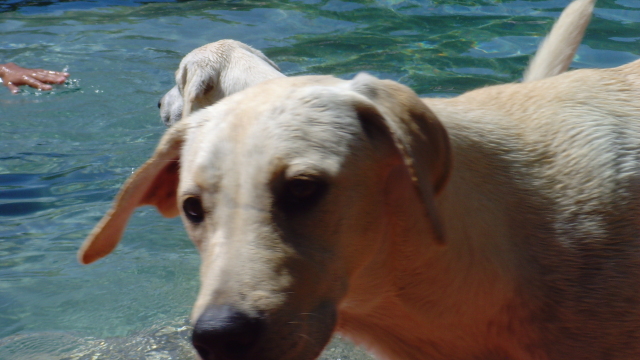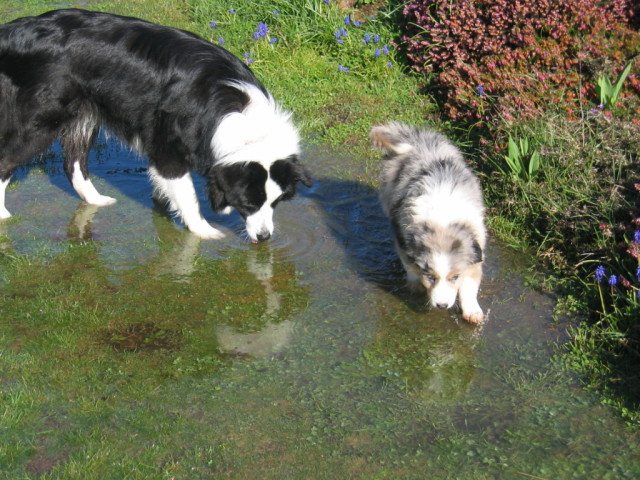QuestionMy dog is very frightened of thunder storms. She is a rescued dog and I love her dearly. She is a Westy 7 yrs old. I give her 1-1 1/2 of .25mg of ALPRAZOLAM before the storm. I don't like drugging her, but she gets terrified before and during the storms. Now just plain rain frightens her. Can you help me, or recommend someone that can.
AnswerIt's very common for dogs to be frightened of thunder storms. This is a LEARNED behavior, heavily reinforced by humans. If the dog exhibits any fear behaviors, its person normally pets, pats, talks to, attempts to reassure the dog. Dogs experience this reaction as primary reward; it's rather like saying, "Yes, be afraid, be very afraid." Unfortunately, by age 7 the dog's fear behavior might be firmly set but that does not mean it has to worsen, as it apparently has. The dog is now afraid of rain because she has learned that the sound of rain (or even the presence of rain if she's outside) accompanies the sound of thunder. This is called generalization. Giving her the drug when you know a thunderstorm is coming might be doing more for you than it is doing for her. Additionally, preparing her medicinally might involve other of your behaviors that cue her. Perhaps you are overly solicitous because you are worrying for her, but she is definitely picking up on this and it might actually be making things worse. If you're giving her the drug at the onset of the storm, it's too late to help her but it certainly might worsen her fear because she may begin to connect the effects of the drug (20 minutes or so later) with the storm. Being put into a consciousness compromised condition is not pleasant.
There is some thought that heavily sedating an animal and then allowing it to come to consciousness in the middle of the fear inducing situation can extinguish fear. I have seen this work but I certainly don't recommend it because it can also backfire! If the dog feels physically compromised because of the medication, its fight/flight mechanism is functionally disconnected (because it cannot flee!) and the next two choices are aggression or a frozen state.
You, yourself, might have anxiety during thunderstorms (not uncommon! I don't like them much either) and this is immediately communicated to your dog who is observing your body language very closely at all times and especially during times of external stressful stimuli. Your demeanor during thunder storms must be casual; in fact, HAPPY. This helps the dog enormously over time; meanwhile, keeping your hands OFF the dog during a thunderstorm (despite your strong urge to COMFORT, which is misconstrued by the dog as reward) is essential.
You can obtain a cd of thunderstorm activity and rain and begin to change the dog's associations with these sounds very, very slowly. This requires very close observation of the dog's body signals (so you do not reward her fear at ALL but only her physical signs of normalcy). You can play the cd for several seconds and reward the dog so long as she shows absolutely no fear, then remove yourself when she begins to show signs of stress (while turning the cd off at the same time.) Very slowly her stress signals should begin to show themselves later and later. This requires a great deal of time but it does work. Alternatively, simply ignoring the dog during thunderstorms (regardless of how horrible it makes you feel to do this because you're actually going against your natural tendency to want to comfort) will also slowly extinguish the dog's reaction. Because of the dog's age (coupled with how she obtained this strong fear reaction, something we will never know) you might never totally extinguish her fear reaction. But you can certainly attempt to minimize it.
I have no idea where you live and even if I did I couldn't possibly recommend anyone. If you feel you'd benefit from a consultation with a behaviorist, contact the veterinary college closest to your home and ask for a referral to a credentialed animal behavior expert. Your dog's problem is quite common and there's a plethora of techniques available to treat it.

 Dog walking problems
Question
Snickers
I have been trying to train my dog SN
Dog walking problems
Question
Snickers
I have been trying to train my dog SN
 Psychological trauma
Question
Izzy
I recently took my 1 year old dog to a fr
Psychological trauma
Question
Izzy
I recently took my 1 year old dog to a fr
 Dog in Heat?
QuestionLily and Jorge
QUESTION: Hello,
We have
Dog in Heat?
QuestionLily and Jorge
QUESTION: Hello,
We have
 Very Scared Dog
Question
Happy
My dog is 17 months old and is a mixed b
Very Scared Dog
Question
Happy
My dog is 17 months old and is a mixed b
 Post bladder surgery potty training for INDOORS!
QuestionTiki
QUESTION: Dear Dr. Connor,
My 10 ye
Post bladder surgery potty training for INDOORS!
QuestionTiki
QUESTION: Dear Dr. Connor,
My 10 ye